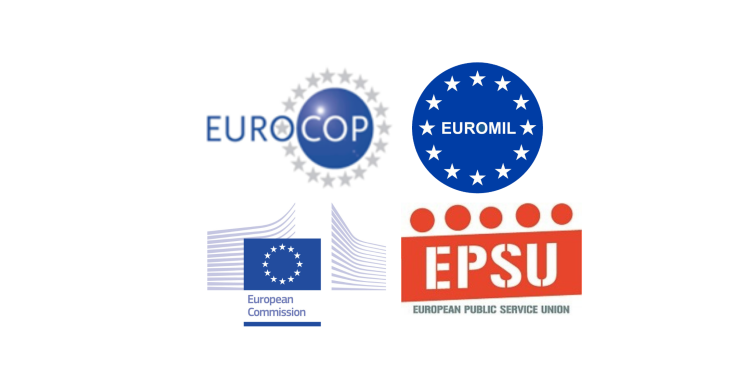Strengthening & Protecting TU Rights in the Public Sector: Penultimate Regional Meeting Takes Place
On 8 and 9 March, the fourth regional meeting in the joint project between EUROMIL, EPSU and EuroCOP, on strengthening and protecting trade union rights in the public sector, took place online. This session focused on the situation in Croatia, Slovenia, Serbia, North Macedonia, Albania, Montenegro and Turkey. It is the penultimate meeting in the project.
Both morning sessions were conducted in a similar format as the previous three regional meetings. Alexander de Becker of Ghent University gave an overview of the specific situation in each country regarding the reality on the ground for public sector workers and the legislation that is in place. EPSU’s Nadja Salson also gave an update regarding the EU sectoral social dialogue as well as a presentation on the treatment of workers in relation to the Transparent and Predictable Working Conditions Directive. As was the case with the previous meetings, Carlos Carrion-Crespo, International Labour Organisation specialist on public services and utilities, presented on ILO Convention 151 and Stefan Clauwaert, Senior Legal and Human Rights Advisor at ETUC, provided information on the legal strategies available to defend trade union rights.
While each regional meeting more or less runs with the same format, an interesting point of difference is the discussion arising from participants’ observations and experiences within the context of their country. The first morning session featured an intervention from Ahmet Zengin, a close contact of EUROMIL and founder of the military trade union in Turkey. Mr Zengin highlighted the difficulties facing the military in Turkey as well as the financial challenges facing the union. He stressed the importance of upholding communication with EUROMIL, in particular being from a non-EU member state, as well as the importance of the project itself in establishing dialogue from public sector workers across all fields, not just between those in the same sector. This sentiment was echoed throughout both sessions from various participants, including an example of solidarity in action from Radmila Obrenovic, a healthcare worker in Serbia, who highlighted how Serbian public sector healthcare workers were supporting their military counterparts in achieving the same basic employment rights.
During the second session, Mr Carrion-Crespo focused his presentation on police labour relations in particular. An interesting observation arising out of this presentation was the differences in the culture across different fields in the public sector and organising. For instance, the armed forces generally does not have a history of collective action in seeking better conditions in the workplace in comparison to the police forces, whereby although it takes on a different form to other public sector workers, nonetheless has a more prevalent culture of organising and solidarity between members – largely due to the closeness of the armed forces as an institution to the state. This point was touched upon also by Antonio Lima Coelho, Board Member at EUROMIL and Portuguese member association representative as to the situation for members of the armed forces. Mr Carrion Crespo pointed out the differences in the perception amongst military personnel as they find it difficult to perceive themselves as workers like other members of the public sector, often because they themselves are required to take up the positions of striking workers in emergency situations and so are, in effect, ‘crossing the picket line,’ albeit without little choice in the matter.
Picking up on the concept of ILO Convention 151 as a tool for public sector workers to strengthen and protect their rights in the workplace, Mr Clauwert focused on the provisions of the Council of Europe and how best to utilise them and emphasised the importance of members of all three affiliates in making use of EUROMIL, EPSU and EuroCOP in assisting them in making collective complaints to the European Committee of Social Rights. The sessions finished up with a number of interventions from participants expressing their wholehearted support and enthusiasm for the joint project, including from Marija Berislavic from the Union of Croatian Nurses and from Goran Novak from Slovenia.
The fifth and final regional meeting is due to take place on 10 and 11 May 2022.

